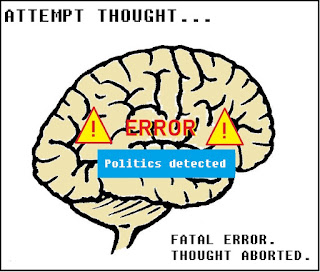I believe I can see all sides of any issue. I could argue for or against anything. (Not that I would, except in my own mind, because why clutter an issue unnecessarily?)
Maybe it's a bad sample, but no one I know in person seems to be able to do this. Not even a little. No matter how I try to get them to even explain what "the other side" would argue, they can't seem to do it. Which I find interesting.
However, being able to argue (or articulate) the other side isn't the same as buying what they are selling. Once I've reached a conclusion I'm not going to change my mind until (or unless) some new data comes in (which has happened many times over the years). Rehashing the same points I've already incorporated into my decision isn't going to change anything. And irrelevant data doesn't count. If it's an ethical principle, showing me how "dangerous" it could be if misused is irrelevant to my decision. Danger only figures in if I'm trying to decide whether to jump off of something.
If there's nothing new to add, you're wasting your time discussing it.
Of course, that goes for me trying to convince the other side, too.
So, trying to convince the other side out of something they've already decided is probably pointless. The best you can do is to show all the information to anyone watching (who hasn't already decided) so they might make a better-informed choice.
Unless, as has been postulated, we all believe first, and then look for data that supports what we already believe. If that's the case, why discuss anything important with anyone, ever? You may as well spend all your time gossiping about people, or talking about what "The News" wants you to talk about. That seems to be the popular choice anyway.
-
Please support the Tobbles Memorial Cat & Kitten Rescue Project on Patreon
The help I've gotten so far has taken some of the pressure off.
Thanks to those of you who've helped!


"Unless, as has been postulated, we all believe first, and then look for data that supports what we already believe. If that's the case, why discuss anything important with anyone, ever?"
ReplyDeleteBecause that someone may not believe anything about X yet (may have never even thought about X before!), giving you the opportunity to give him or her something to believe about X.
And that one little wedge might just grow, causing him or her to start re-evaluating beliefs about A, B, C, D ...
If the person already believes something about X, it may be impossible to change his or her mind. But if not, it may end up going somewhere.
Agreed.
Delete